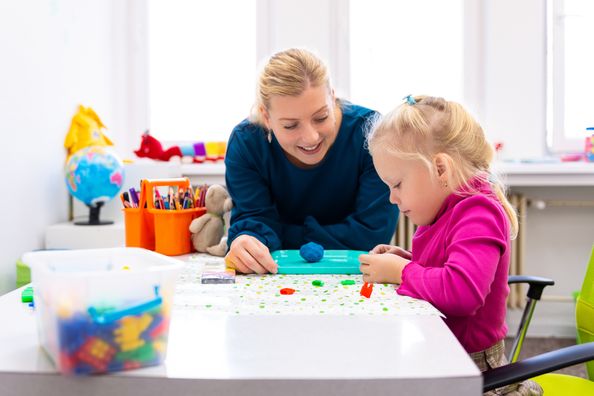It’s National Play Therapy Week! At Quincy Medical Group (QMG), we have trained Play Therapists who utilize play to support and help their patients. Two of our therapists, Amy Hasting and JoAnn O’Rourke, answered the questions below about the benefits of play therapy and how the power of play can help your kiddos at home.
What is Play Therapy?
Play therapy occurs when licensed therapists apply the healing powers of play to help children (or people of any age) deal with life’s difficulties. Play is often described as a child’s language. Young children who are involved in therapy do not sit down and talk to a therapist like adults do. They are more active and less able to verbalize their thoughts and feelings. They can, however, act them out and express them through play and movement.
Garry Landreth, an expert in play therapy, states that “play therapy is defined as a dynamic interpersonal relationship between a child (or person of any age) and a therapist trained in play therapy procedures who provides selected play materials and facilitates the development of a safe relationship for the child (or person of any age) to fully express and explore self (feelings, thoughts, experiences, and behaviors) through play, the child’s natural medium of communication, for optimal growth and development.” (Play Therapy: The Art of the Relationship, page 11)
What happens in a Play Therapy session?
There are several different methods or theories of play therapy, such as Theraplay, Child-Centered Play Therapy, Sandplay Therapy, and many more. Each therapist strives to create a welcoming and safe environment in which their patients may feel free to explore their experiences and interactions with the world and to heal any wounds which may need care.
Are there play activities parents can implement at home to benefit their children?
One of the best things that parents can do is spend 15 – 20 minutes per day (or at least several times per week) just playing with their children in whatever way the child would like to play (but not on their electronics or video games). This will show your children that they matter to you and whatever they are thinking or doing matters to you as well. During this time the parents will want to follow rather than “lead” the child in play, observing and “actively listening” — reflecting back to the child what you are observing without making any judgments, just accepting your child wherever they are in their development.
To learn more about our Behavioral Health therapy team, call (217) 222‑6550, ext. 3418.
Health Topics:







